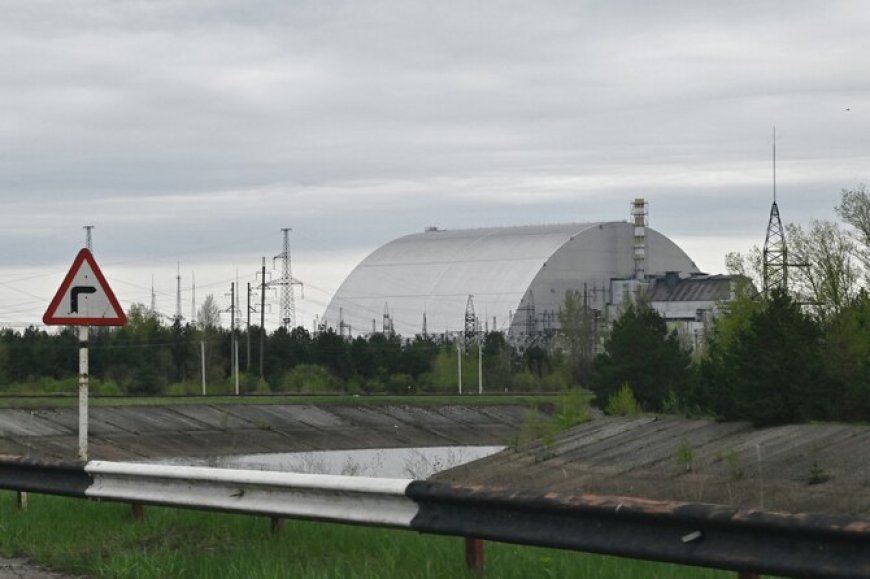Zelensky is accused by Russia of orchestrating the Chernobyl drone attack in order to secure additional Western assistance
Russia has refuted Ukrainian President Volodymyr Zelensky's contention that a Russian drone strike had targeted the Chernobyl nuclear power facility, in the most recent escalation of rhetoric between Moscow and Kyiv. Foreign Ministry spokesperson Maria Zakharova promptly and unwaveringly communicated Moscow's official response.

Russia has refuted Ukrainian President Volodymyr Zelensky's contention that a Russian drone strike had targeted the Chernobyl nuclear power facility, in the most recent escalation of rhetoric between Moscow and Kyiv. Foreign Ministry spokesperson Maria Zakharova promptly and unwaveringly communicated Moscow's official response.
Zakharova characterized Zelensky's assertions as a calculated "provocation" that was designed to sway international opinion and exert pressure on the West to provide additional weapons and assistance.
Zelensky had claimed that the radiation containment shelter at the Chernobyl plant, which continues to contain the remnants of the 1986 nuclear catastrophe, had sustained substantial damage as a result of a Russian drone.
Fortunately, radiation levels remained stable following the incident, which occurred as global leaders convened in Munich for the 2025 Security Conference, according to Zelensky. The high-stakes nature of the conference, in conjunction with the timing of the accusation, appeared to increase the stakes for Ukraine in its pursuit of ongoing Western support.
Nevertheless, Zelensky was promptly accused by Russia of orchestrating the entire incident. The Ukrainian president, according to Zakharova, had orchestrated the assault as a distraction to enhance his diplomatic bargaining power. She declared, "Zelensky travels with performances that are backed up by provocations," implying that the Ukrainian government was employing the apprehension of a nuclear calamity as a form of "blackmail" to secure Western support. Zakharova's accusations were indicative of the increasing animosity between the two nations, in which accusations of propaganda and manipulation have become the norm.
The Chernobyl plant, a symbol of the catastrophic consequences of nuclear energy, is a relic of the most infamous nuclear catastrophe of the Cold War. It is of particular importance in the ongoing conflict due to its proximity to the frontline and its potential to serve as a focal point for additional destabilization. The notion of weaponizing a nuclear site for political gain is profoundly alarming, given the plant's legacy and the sensitive nature of any nuclear incident.
However, the assertion that the attack was a staged performance appears to be an unscrupulous dismissal of Ukraine's genuine vulnerability, despite the fact that Zelensky's accusation was made during critical discussions regarding Ukraine's future at the Munich Security Conference.
The assertion that the Ukrainian president orchestrated the strike in order to secure additional assistance from the West is not only unfounded but also perilously reductive. This rhetoric reduces genuine human suffering and international tensions to a matter of political theater, framing an increasingly intricate geopolitical crisis as little more than a theatrical spectacle.
The willingness of both parties to exploit every incident for strategic advantage is what is most striking about this exchange, as it blurs the lines between actual threats and manufactured narratives. Russia's allegations of "nuclear blackmail" are not novel; Moscow has consistently attempted to portray Ukraine—and, by extension, its Western supporters—as engaging in reckless posturing.
In the interim, Ukraine has every justification to underscore its vulnerability and struggle on the global stage, as it continues to defend itself against a much larger and more powerful adversary. Kyiv has few alternatives other than to continue appealing to international allies, given the staggering toll of the conflict on Ukraine's infrastructure, economy, and population.
However, the blame game surrounding a potential drone assault is not merely a dispute over a single incident; it is a reflection of the more extensive geopolitical conflict surrounding Ukraine's future. Ukraine has received consistent support from Western countries, particularly the United States and European powers.
However, the question of how far they will go to provide military aid, humanitarian assistance, and economic relief is becoming increasingly pressing. Ukraine's survivability has been significantly influenced by its reliance on Western support; however, this dependence has also led to accusations of manipulation, as evidenced by Russia's response.
The incident serves as a reminder of the stakes involved in the conflict, as it pertains to the Munich Security Conference, where top officials from the U.S., Ukraine, and Europe were engaged in discussions.
The West's commitment to maintaining its support for Ukraine is being put to the test, and the necessity of a diplomatic resolution is becoming increasingly apparent. Nevertheless, the prospect of a resolution appears to be more challenging than ever, as both parties accuse the other of exploiting the conflict for political benefit.
In conclusion, Russia's accusations may be motivated by a desire to erode Ukraine's credibility; however, they also illustrate the increasing tension regarding the manner in which the conflict is being presented on a global scale. Zelensky's statements regarding the Chernobyl disaster may have been politically strategically placed; however, it is impossible to disregard the fundamental reality:
the possibility of a nuclear catastrophe, whether incidental or intentional, continues to exist. The war in Ukraine is far from over, and its repercussions will continue to reverberate across the globe in a world that is already saturated with geopolitical intrigue, where the line between reality and provocation often becomes obscured.













































